Hamed Hosseiny
Downlink Transmission in FBMC-based Massive MIMO with Co-located and Distributed Antennas
Nov 17, 2023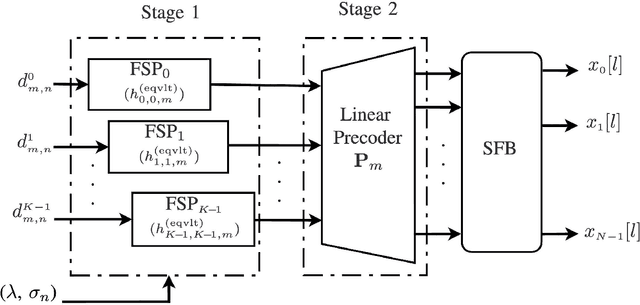
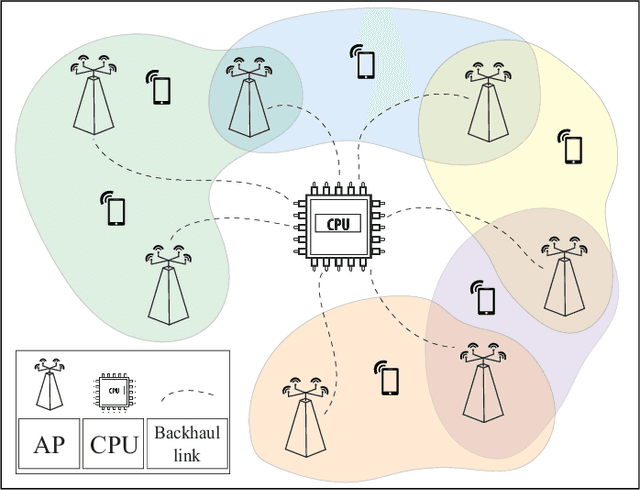
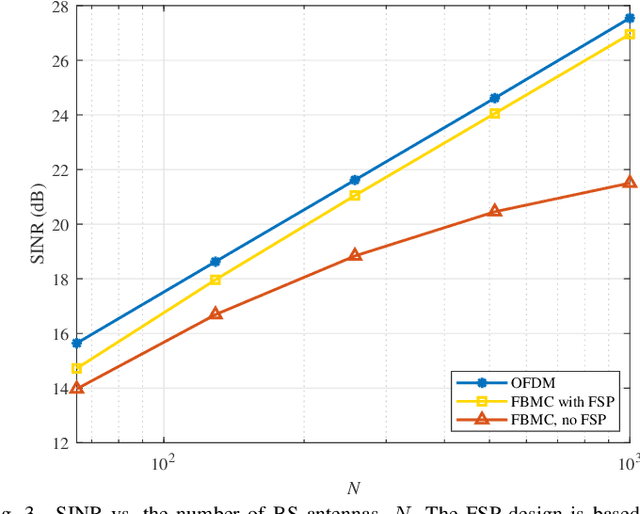
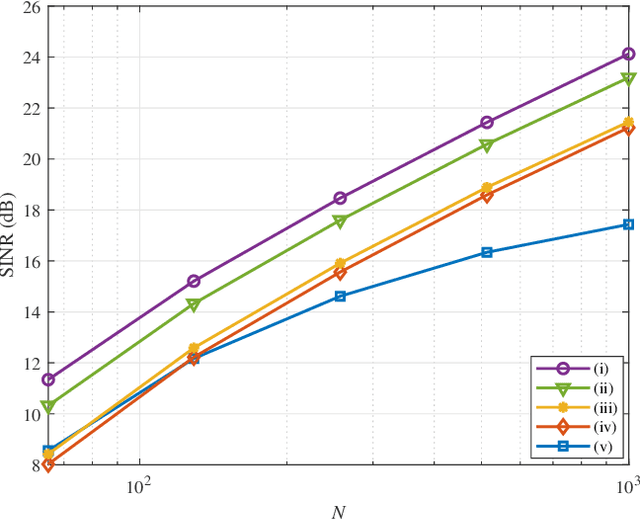
Abstract:This paper introduces a practical precoding method for the downlink of Filter Bank Multicarrier-based (FBMC-based) massive multiple-input multiple-output (MIMO) systems. The proposed method comprises a two-stage precoder, consisting of a fractionally spaced prefilter (FSP) per subcarrier to equalize the channel across each subcarrier band. This is followed by a conventional precoder that concentrates the signals of different users at their spatial locations, ensuring each user receives only the intended information. In practical scenarios, a perfect channel reciprocity may not hold due to radio chain mismatches in the uplink and downlink. Moreover, the channel state information (CSI) may not be perfectly known at the base station. To address these issues, we theoretically analyze the performance of the proposed precoder in presence of imperfect CSI and channel reciprocity calibration errors. Our investigation covers both co-located (cell-based) and cell-free massive MIMO cases. In the cell-free massive MIMO setup, we propose an access point selection method based on the received SINRs of different users in the uplink. Finally, we conduct numerical evaluations to assess the performance of the proposed precoder. Our results demonstrate the excellent performance of the proposed precoder when compared with the orthogonal frequency division multiplexing (OFDM) method as a benchmark.
Downlink Precoding for FBMC-based Massive MIMO with Imperfect Channel Reciprocity
Jan 26, 2022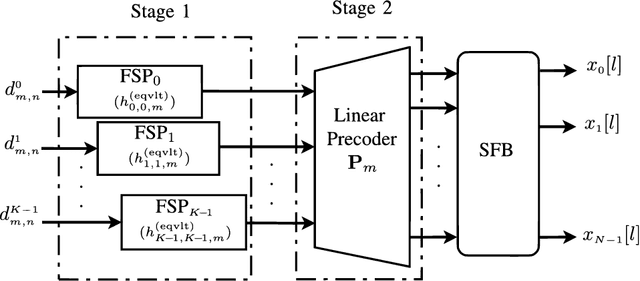
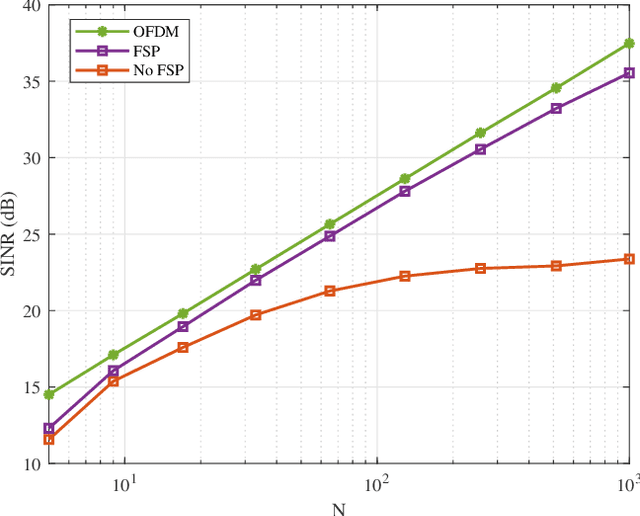
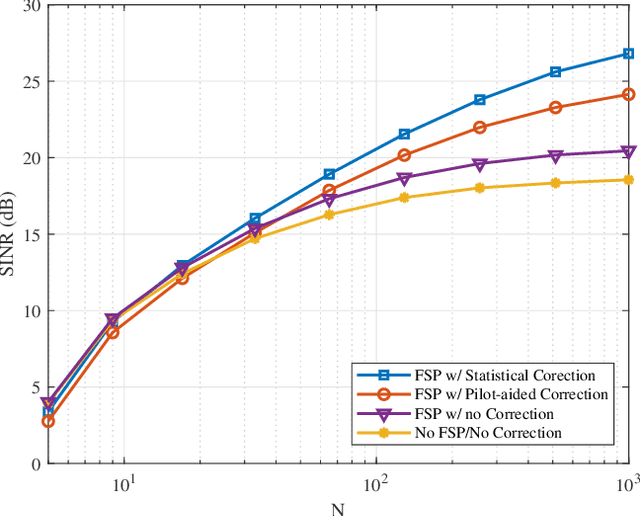
Abstract:In this paper, a practical precoding method for the downlink of filter bank multicarrier-based (FBMC-based) massive multiple-input multiple-output (MIMO) is developed. The proposed method includes a two-stage precoder consisting of a fractionally spaced prefilter (FSP) per subcarrier for flattening/equalizing the channel across the subcarrier band, followed by a conventional precoder whose goal is to concentrate the signals of different users at their spatial locations. This way, each user receives only the intended information. In this paper, we take note that channel reciprocity may not hold perfectly in practical scenarios due to the mismatch of radio chains in uplink and downlink. Additionally, channel state information (CSI) at the base station may not be perfectly known. This, together with imperfect channel reciprocity can lead to detrimental effects on the downlink precoder performance. We theoretically analyze the performance of the proposed precoder in the presence of imperfect CSI and channel reciprocity calibration errors. This leads to an effective method for compensating these effects. Finally, we numerically evaluate the performance of the proposed precoder. Our results show that the proposed precoder leads to an excellent performance when benchmarked against OFDM.
FBMC Receiver Design and Analysis for Medium and Large Scale Antenna Systems
Mar 23, 2021



Abstract:In this paper, we design receivers for filter bank multicarrier-based (FBMC-based) massive MIMO considering practical aspects such as channel estimation and equalization. In particular, we propose a spectrally efficient pilot structure and a channel estimation technique in the uplink to jointly estimate all the users' channel impulse responses. We mathematically analyze our proposed channel estimator and find the statistics of the channel estimation errors. These statistics are incorporated into our proposed equalizers to deal with the imperfect channel state information (CSI) effect. We revisit the channel equalization problem for FBMC-based massive MIMO, address the shortcomings of the existing equalizers in the literature, and make them more applicable to practical scenarios. The proposed receiver in this paper consists of two stages. In the first stage, a linear combining of the received signals at the base station (BS) antennas provides a coarse channel equalization and removes any multiuser interference. In the second stage, a per subcarrier fractionally spaced equalizer (FSE) takes care of any residual distortion of the channel for the user of interest. We propose an FSE design based on the equivalent channel at the linear combiner output. This enables the applicability of our proposed technique to small and/or distributed antenna setups such as cell-free massive MIMO. Finally, the efficacy of the proposed techniques is corroborated through numerical analysis.
 Add to Chrome
Add to Chrome Add to Firefox
Add to Firefox Add to Edge
Add to Edge